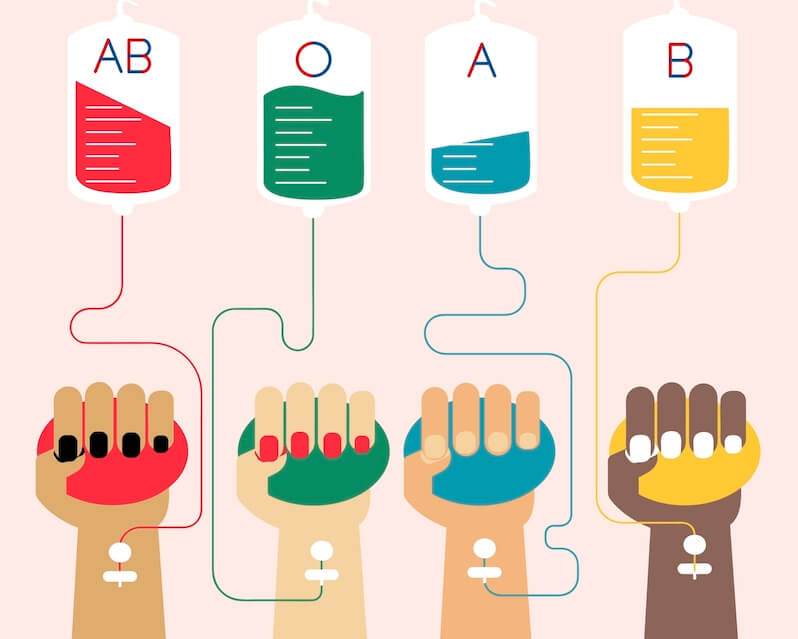Blood Type, Other Blood Proteins Implicated In COVID Severity

By Molly Walker
Eleven blood markers, including the ABO protein that determines blood group, were implicated in severe COVID outcomes in a genomic analysis of clinical data.
After examining more than 3,000 blood proteins against those found in hospitalized and severe COVID cases, six proteins had a causal link with increased risk of hospitalization and five proteins were linked to COVID-related need for respiratory support, death, or both, with odds ratios ranging from 1.12 to 1.35.
Another 17 blood proteins had a causal association with reduced risk of severe COVID, reported Alish Palmos, PhD, of King's College London, and colleagues.
Palmos' group noted that this is the first study to examine such a large number of proteins to determine their connection to COVID severity.
"What we have done ... is provide a shortlist for the next stage of research," said co-author Gerome Breen, PhD, also of King's College London, in a statement. These data "present a potentially important avenue for further research to better understand the mechanisms behind COVID-19 with an ultimate aim of developing new treatments but potentially also preventative therapies."
Specifically, they highlighted that the ABO protein was implicated in severe COVID, which suggests that blood groups play a key role in people developing severe disease.
"Our study does not link precise blood group with risk of severe COVID-19 but since previous research has found that proportion of people who are group A is higher in COVID-19 positive individuals, this suggests that blood group A is a more likely candidate for follow-up studies," said co-author Christopher Hübel, PhD, also of King's College London, in a statement.
The authors noted how difficult it is to examine the role of "immunomodulatory blood proteins" without accounting for a host of clinical confounders in patients with severe COVID, such as initial viral exposure, smoking status and BMI, all of which may contribute to "high pro-inflammatory cytokine levels."
They examined data from several sources, including from genome-wide association studies (GWAS), to identify blood proteins. Palmos' team then looked at the COVID-19 Host Genome Initiative GWAS meta-analysis of individuals hospitalized due to COVID symptoms versus controls and its comparison of "very severe respiratory confirmed COVID vs. the population," which examined hospitalized individuals who needed respiratory support or died from COVID versus controls. All used a European sample.
Palmos' group identified six blood markers that were "significantly casually associated" with COVID-related hospitalization, with an increase in odds of hospitalization ranging from 7% to 19%, the authors wrote. Notably, fatty acid hydrolase 2 (FAAH2) had the strongest association (OR 1.19, 95% CI 1.12-1.25).
Five proteins were linked to an increased need for respiratory support, death from COVID, or both, with an increase in odds of severe outcomes ranging from 12% to 35%. Glucosaminyl (N-Acetyl) transferase 4 (GCNT4) had the strongest association (OR 1.35, 95% CI 1.26-1.44).
The authors also identified nine proteins linked to a relative 7% to 20% decreased risk of COVID-related hospitalization. Likewise, eight blood markers were associated with a lower risk of severe COVID, ranging from an 11% to 27% decrease. In both instances, the strongest association was for platelet endothelial cell adhesion molecule (PECAM-1, OR 0.80, 95% CI 0.73-0.87 and OR 0.73, 95% CI 0.63-0.83, respectively).
However, they added that their analysis did not identify "typical canonical immune proteins," such as interleukin 6 or C-reactive protein, which "suggests that with a larger database of proteins, we can pinpoint non-canonical immunomodulatory proteins relevant to disease pathophysiology."
Additional limitations included the possibility of false positive associations due to the Mendelian randomization analysis methodology used; that some blood markers were excluded due to unavailability, which would miss associations between these markers; and that other GWAS might have been better for identifying severe COVID phenotypes, although not available at the time of the study.
 Join/ Renew
Join/ Renew







